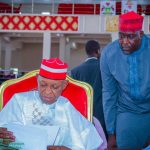I finished reading IBB’s memoir with great nostalgia and mixed feelings. As a human like every one of us, the “Evil Genius” narrative is awash with “The Good, the Bad, and the Ugly,” and trust IBB to be Maradonic as usual.
In a way, it is a story of history and the Nigerian character, with its kaleidoscopic view of the selfishness of the Nigerian elites (especially in the military and political class).
Many rushed to condemn IBB, forgetting that no single individual makes history in isolation, even though he can direct its flow.
From the narrative, I have seen an ambitious young boy at Bida College learning the ropes on how to manipulate his assets, using power as a Head Boy. A young man, in the theater of war, realizing the value of life and the need to do what he must. A near-death experience awakening and propelling ambition. Strategic partnership as a key to navigating one’s way toward a goal. And in his matrimonial union with Maryam, not only did IBB find his soulmate and the love of his life, but also a queen who ensured his ascension as king.
As a young military officer, he learned the ropes of navigating the corridors of power as he rose in the hierarchy. Was it by accident or by design that IBB left the shores of Nigeria for short courses abroad twice during national emergencies? Was it by accident or strategic design that he featured in major coups d’état, with each one advancing his career further?
Is it military culture or a personal anomaly that he has a penchant for appearing unforgiving and betraying the friendship of his closest allies—Mamman Vatsa, Abiola, Abacha?
Even though he repeatedly took responsibility in his memoir for the failures of his administration, especially the June 12 saga, he also Maradonically shifted some of the blame onto Abacha. Is that not being austere with the truth or outrightly hypocritical?
One may accuse IBB of many things, but one thing you cannot accuse him of is not being a nationalist. And I stand to be corrected—no leader in our history has left as many legacies for modernizing our economy, politics, and social structures. One could write an entire article on IBB’s legacies.
The only reason, I believe, that scuttled IBB’s chance of becoming one of the greatest African leaders in modern times was his addiction to self-preservation and his attempt to please the elites.
In conclusion, I think IBB’s failure was our collective failure. During his reign, he involved every elite worthy of mention in his administration, from across the length and breadth of this country. He opened up the economy, the polity, the media, and the academia with meaningful initiatives. But as his nationalism was skewed toward elitism, the same elites orchestrated his downfall. Nevertheless, IBB indeed achieved all his ambitions for power, and even in retirement, his hilltop mansion became a Mecca for the elites.
As he prepares to exit the stage, trust IBB to grandstand one final time. The launch of his book, though long overdue, was his final statement aimed at the elites. And they responded in kind, making it the largest book launch ever recorded, with over 17 billion naira raised for the book and library.
One big lesson I have learned from IBB’s life is: “When you try to please everyone, you may end up displeasing all.” As humans, we may rush to judge him in one way or another, but prosperity has already begun its pronouncement. Ultimately, the final judgment rests with his Maker.
Ali Abubakar Sadiq wrote this piece from Kano – Nigeria





